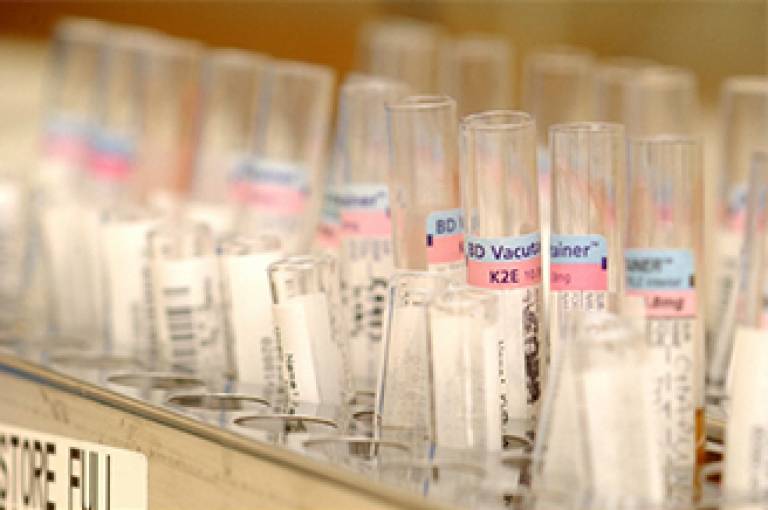New blood test for prostate cancer could reduce the need for painful biopsies
1 September 2016

A UCL research team led by Dr Andrew Feber is developing a blood test that could dramatically improve the way that prostate cancer is diagnosed and monitored, consequently saving thousands of men a year from undergoing painful and unnecessary biopsy tests.
The test will look for prostate cancer-specific DNA changes that can be detected in the blood of men with the disease. The researchers want to compare their new liquid biopsy-based test to the standard way of diagnosing prostate cancer (a PSA test and TRUS biopsy) to determine whether this could be a quicker, cheaper, less invasive and more accurate way to diagnose aggressive forms of prostate cancer.
“The PSA test, which is the current ‘gold standard’, is highly inaccurate. About three quarters of men who are diagnosed with raised PSA won’t have cancer, meaning a significant proportion of men undergo highly invasive, expensive and unnecessary biopsy to rule out the presence of disease.” says Dr Andrew Feber, Senior Research Associate at the UCL Cancer Institute.
“We want to try to find a better, more accurate non-invasive way of identifying men who really do have prostate cancer. We are not trying to replace biopsies but looking to reduce the number of unnecessary, invasive and expensive biopsies in men who do not have disease.”
The research team are not looking for genetic mutations in the DNA code itself, rather they are looking to identify chemical modifications to the DNA after it becomes cancerous. These epigenetic changes alter how the DNA functions but the basic DNA code stays the same. It is the pattern of changes that can reveal whether the DNA is from the prostate rather than anywhere else, whether it’s normal or cancerous and how aggressive the disease is. Dr Feber and his team have identified a panel of prostate cancer-specific epigenetic modifications that can be detected in tumour DNA circulating in the blood.
The team thinks that this panel could also be useful in monitoring how well men are doing after a first-line prostate cancer treatment, and keeping track of whether or when the cancer comes back.
Dr Feber says: “Our hope now is to use our data as a basis to develop a clinical trial to confirm the benefits in using this test for prostate cancer diagnosis and post treatment monitoring, and ultimately something that could be made routinely available to patients.”
This project received funding of £334,000 from a Translational Research Award from Prostate Cancer UK and The Movember Foundation. The research follows-on from an £1.4 million MRC DPFS award to Professor John Kelly and Dr Feber to validate a non-invasive assay (UroMark) for the detection of bladder cancer through two non-IMP clinical trials.
Further information
- Dr Andrew Feber academic profile
- Professor John Kelly academic profile
- Image: Wellcome Images Wellcome Library, London
- Source: Prostate Cancer UK
 Close
Close

